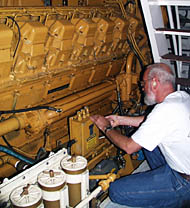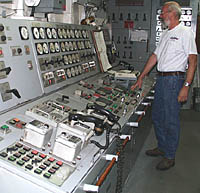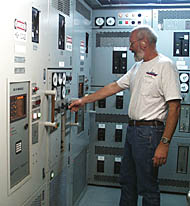|
|
Interviews: Chief Engineer Ron Wheatley
Question:
Describe one pivotal moment in your life that influenced where you are now. Ron: After I graduated, I wanted to do something different for a while, so I left Boston and spent several months hiking through Alaska and the Yukon Territory of Canada. By the time I returned, I had decided that I would eventually go back to college to continue studying literature. But, because I didn’t have money for tuition, I planned to join the Navy to earn the GI Bill (a program of the US armed services that allows veterans to have their college tuition paid for). While my application for Officer Candidate School was being reviewed, I happened to read a magazine article about the US Coast Guard. The Coast Guard seemed like a useful organization, so I signed up and was on my way. One thing led to another, and here I am 25 years later. It’s been an interesting journey and I’m lucky to have friends all over the world. Question: What are your main responsibilities during the cruise? Ron: I am responsible for the effective and safe operation of all the engineering equipment on board RV Melville. This includes the propulsion machinery, deck machinery, and the “hotel services” (things like water, electricity, plumbing and sewage). There are ten people in the engineering department, and we operate, maintain and repair most of that equipment. We provide many of the essential services that people have ashore. We make our own electricity using generators; we make our own drinking water from seawater; we have our own sewage treatment plant; and we provide heating, air conditioning, refrigeration, and phone services, to name a few. Each person in the department has a very important job to do, and it’s my job to make sure that they have the tools, spare parts, equipment, and support that they need to do their jobs.
Question: What was the greatest challenge that you faced in your life and how did you overcome it? Ron: The greatest challenge happened on the first cruise that I sailed as Chief Engineer. I was nervous because I was keenly aware of my new responsibilities. An error in judgment on my part could have serious implications -- and I wasn’t so sure that my judgment was up to the task! My imagination had a field-day tormenting me with “what-if” catastrophes and worst-case scenarios! As luck would have it, one of them came true -- the deep sea winch broke down so that it would not haul in the wire. Over three and a half miles below the ship, a very expensive side scan sonar package was hanging on the wire and the winch refused to pull it in. We spent many hours tearing into the machinery and troubleshooting. Most of us in the engine room were involved in one way or another. Finally, we were able to coax the winch into running well enough to get the gear back on deck. It was teamwork that got us through that challenge, and I learned a very valuable thing -- I was part of a talented team that was up to tough challenges -- so I could relax a little. There were also other smaller problems that trip, including a main engine that broke down on the way home! Question: When you are not working, what do you like to do in your spare time? Ron: On the ship, I do a lot of reading in my spare time. I also exercise and play around with computers. Ashore, I spend as much time as possible getting away from it all. I spend the summer months at my home in the mountains of north-central Washington state, and the winter months exploring the deserts of California, Arizona, or west Texas. Question: What do you like most and least about going to sea? Ron: I really enjoy being underway on a ship; running at cruising speed, especially for home port or for a place that I’ve never been before. What I like best though, is the camaraderie and friendship of my shipmates. When I’m at sea, I miss the simple pleasure of being able to go to a bookstore or a hardware store and roam around for hours. But more than anything, I miss the peaceful solitude of being in the north woods or in the desert.
|
||||||
|
|
|||||||
© 2010 Dive and Discover™. Dive and Discover™ is a registered trademark of
Woods
Hole Oceanographic Institution



